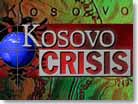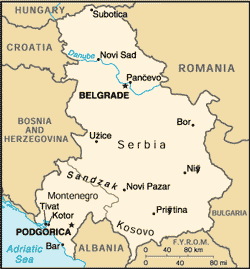|
Counting the costs of Kosovo
|
 |
April 13, 1999: 11:25 a.m. ET
To Serbia's neighbors, war means severed trade routes, added strain
|
LONDON (CNNfn) - Serbia's immediate neighbors - emerging economies such as Romania, Croatia, Macedonia and Bulgaria - are paying a heavy price for their proximity to the war zone.
Long-plied trade routes to - and through - Serbia have been bombed out of commission by the western alliance in its efforts to stop the slaughter in the Serbian province of Kosovo.
NATO's obliteration of two strategic bridges on the Danube, at Novi Sad and Pancevo, and the crippling of roads and by-ways throughout Serbia, have severed crucial arteries at the crux of East-West trade routes.

Serbia and its neighbors
"This comes as another blow because we already suffered a lot from the embargo on Serbia imposed because of the Bosnia conflict," said a Romanian diplomat in London. He estimated half of Romania's Danube fleet had been immobilized. Trade between Serbia and Romania totals about $800 million annually.
A nuisance at time of hope
As for Bulgaria, only 2.3 percent of its exports go to Serbia, compared with 5.4 percent to the Balkan region as a whole. The EU soaks up nearly half of Bulgaria's exports.
The debris that has rendered the Danube dangerous for shippers has created a major nuisance for Bulgaria just when the country has been drawing accolades for its macro-economic stabilization plan. The country achieved 1 percent inflation last year, attracting overseas investment of $1.5 billion along the way.
"The natural road links of Bulgaria go through Yugoslavia - this is the quickest, the fastest and the best road," said Valentin Dobrev, Bulgaria's ambassador to the United Kingdom.
Without the Danube artery, Dobrev said, shippers have detoured goods southward through Greece. But this is time-consuming. Thousands of truckers also clog an overburdened bridge that spans the Danube between Romania and Bulgaria.
On the Greek route, Dobrev says, "They are using ferryboats, and this is much more expensive, which makes the Bulgarian goods more expensive and less competitive." Plus, the longer shipping time means greater spoilage.
In another sign of the economic burden from the war, Montenegro, Serbia's partner in the rump republic of Yugoslavia, hinted last week it may introduce the German mark as its main currency if Serbian President Slobodan Milosevic unleashes hyperinflation on the country.
Despite such hardships, experts say the losses for Kosovo's neighbors are likely to be limited and easily recoverable so long as the hostilities don't drag on. This assumes NATO continues to wage its high-tech war from the "safe" remove of the sky.
Assessing the regional risks
Should Slobodan Milosevic fail to back down, and ground troops are ordered in, all economics bets will be off, they add.
"Under the second scenario, the effect on asset prices would be more protracted and would eventually be more differentiated by individual country circumstances," Andrew Roberts, an economist at Salomon Smith Barney in London, wrote in a recent evaluation.
Roberts assessed the risks to four nations - Bulgaria, Macedonia, Bosnia & Herzegovina and Croatia - in terms of refugee influx, threats to outside direct investment, lost export share and declines in tourism.
In each category, Macedonia - where Albanians comprise 20 percent of the population and 27 percent of exports go to Yugoslavia - scored the worst, rating a "high" risk in each category.
Bulgaria, Bosnia and Croatia are seen as faring better, thanks in part to being further away from the combat and to ongoing efforts in each country to remold their post-communist economies in the Western image.
The flotation of a 51 percent stake in Bulgaria's state-owned telephone company, BTC, is expected to attract outside direct investment equal to about 3 percent of the country's total economic output of roughly $17 billion.
Roger Monson, a strategist at Rabobank, believes the Kosovo conflict could hamper efforts by several companies in Croatia and Slovenia - both former Yugoslav republics - to revive business ties to Serbia. Among the potential losers, he said, are Slovenian pharmaceutical companies Lek and Krka, and Croatian drug giant, Pliva, each with annual sales of $300 million.
"One aspect (of the war) will be to turn them even more ambitiously towards the EU," Monson said. "Slovenia is already in the Club of Five (aspirants to the EU)." Croatia had its sights on a similar course, "But they still have this legacy of war."
A boom for building firms?
Looking forward to the war's debris-strewn aftermath, Monson sees a boom for companies in construction and transportation as Serbia digs itself out of the rubble. Petrochemical companies and refineries in Bulgaria and Romania could also get a boost as Serbia will crave ready sources of energy as it rebuilds.
Some say the instability in Kosovo could trigger a relapse to a more chaotic time, just after the break-up of the Yugoslav Republic in 1991.
"Organized crime, which flourished during the early to mid-1990s on the back of sanctions busting, that's more problematic for the government" of Bulgaria, said Charles Robertson, an economist with ING Barings in London.
"The government in Bulgaria has been trying very hard to crack down on corruption and organized crime…(Kosovo) could give organized crime a boost just as they're trying to be accepted as developed."
Nor are the economic effects negligible within Serbia proper. To Milosevic, Kosovo's significance extends beyond its status as the cradle of Serbian civilization and repository of historical memory.
Below ground, the region boasts a rich vein of mineral deposits such as lead, nickel, ore, and zinc coveted at various times this century by Nazi occupiers in World War II, Tito's Communists, and now, Milosevic.
"Yugoslavia itself did not have a whole lot of natural gas or oil," Matthew Sagers, the director of Energy Services at PlanEcon Inc. told CNN. "They did produce some, but they became very dependent upon the resources that they did have - which is the low-quality brown coal and lignite and so forth."
--By staff writer Douglas Herbert with additional reporting from Mark Odell
|
|
|
|
|
 |

|

